Kenneth C. Davis's Blog, page 4
December 21, 2024
Listen to a Conversation about “The World in Books” from Kansas Public Radio
Listen to my conversation with Dan Skinner, a former Director of Kansas Public Radio and the Audio-Reader Network. He is the host of KPR’s Conversations program. The interview is a little over 25 minutes long and presents an overview of
The World in Books: 52 Works of Great Short Nonfiction (Scribner, October 2024)
“On this edition of Conversations, Kenneth C. Davis talks with host Dan Skinner about “The World in Books: 52 Works of Great Short Non-Fiction.” Davis is the New York Times bestselling author of “America’s Hidden History” and “Don’t Know Much About History,” which gave rise to his series of books on a range of subjects, including mythology, the Bible, geography, and the Civil War. This book is designed as an introduction to short books that will make you think about who you are and what you believe.”
–Kansas Public Radio
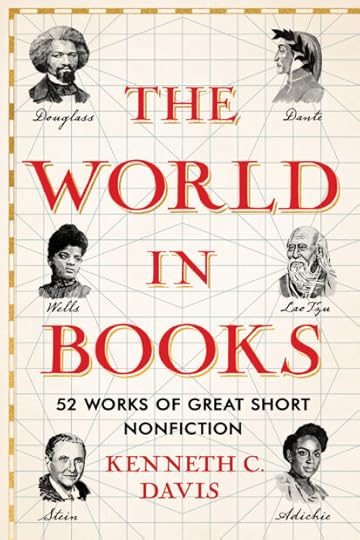
The post Listen to a Conversation about “The World in Books” from Kansas Public Radio first appeared on Don't Know Much.
December 16, 2024
Who Started the “War on Christmas?”

“In the interest of labor and morality” (1895: Image Courtesy of Library of Congress Prints and Photographs Division Washington, D.C. 20540 USA http://hdl.loc.gov/loc.pnp/pp.print)
(12.17.2024 revision of a post first published 12.11.2o13. But it never gets old.)
Fortunately, the so-called “War on Christmas” seems to have disappeared.
Proclaiming a secular assault on the religious significance of the holiday has been a seasonal tradition, just like the Macy’s Parade with Santa Claus. Claiming that “Happy Holidays” or “Season’s Greetings” instead of “Merry Christmas” was a betrayal of Christian America became a staple of conservative talk show hosts and part of America’s political culture wars.
The basic premise: Christmas is under attack by Grinchy atheists and secular humanists who want to remove any vestige of Christianity from the public space. Any criticism of public displays devoted to religious symbols –mangers, crosses, stars — was seen by these folks as part of a wider attack on “Christian values” in America. Mass market retailers who substituted “Happy Holidays” for “Merry Christmas” were part of the conspiracy to “ruin Christmas.”
But in fact, most religious displays are not banned in America. Courts simply direct that one religion cannot be favored over another under the Constitutional protections of the First Amendment. Christmas displays are generally permitted as long as menorahs, Kwanzaa displays, and other seasonal symbols are also allowed.
In other words, the “War on Christmas” is pretty much a phony war. But where did this all start?
The first laws against Christmas celebrations and festivities in America came during the 1600s –from the same wonderful folks who brought you the Salem Witch Trials — the Puritans. (By the way, H.L. Mencken once defined Puritanism as the fear that “somewhere someone may be happy.”)
“For preventing disorders, arising in several places within this jurisdiction by reason of some still observing such festivals as were superstitiously kept in other communities, to the great dishonor of God and offense of others: it is therefore ordered by this court and the authority thereof that whosoever shall be found observing any such day as Christmas or the like, either by forbearing of labor, feasting, or any other way, upon any such account as aforesaid, every such person so offending shall pay for every such offence five shilling as a fine to the county.”
–From the records of the General Court,
Massachusetts Bay Colony
May 11, 1659
The Founding Fathers of the Massachusetts Bay Colony were not a festive bunch. To them, Christmas was a debauched, wasteful festival that threatened their core religious beliefs. They understood that most of the trappings of Christmas –like holly and mistletoe– were vestiges of ancient pagan rituals. More importantly, they thought Christmas — the mass of Christ– was too “popish,” by which they meant Roman Catholic. These are the people who banned Catholic priests from Boston under penalty of death.
This sensibility actually began over the way in which Christmas was celebrated in England. Oliver Cromwell, a strict Puritan who took over England in 1645, believed it was his mission to cleanse the country of the sort of seasonal moral decay that Protestant writer Philip Stubbes described in the 1500s:
‘More mischief is that time committed than in all the year besides … What dicing and carding, what eating and drinking, what banqueting and feasting is then used … to the great dishonour of God and the impoverishing of the realm.’
In 1643, Parliament banned Christmas celebrations.
“The Puritans sought to turn Christmas into a fast day, with an act of Parliament in 1643 declaring that it should be observed ‘with the more solemn humiliation because it may call to remembrance our sins, and the sins of our forefathers who have turned this Feast, pretending the memory of Christ, into an extreme forgetfulness of him, by giving liberty to carnal and sensual delights.’ Two years later, the Directory of Public Worship was unequivocal that feasts such as Christmas had no warrant in scripture.”
–Bruce Gordon, “The Grinch That Didn’t Steal Christmas”
Attending mass was forbidden. Under Cromwell’s Commonwealth, mince pies, holly and other popular customs fell victim to the Puritan mission to remove all merrymaking during the Christmas period. To Puritans, the celebration of the Lord’s birth should be day of fasting and prayer.
In England, the Puritan War on Christmas lasted until 1660. In Massachusetts, the ban remained in place until 1687.
So if the conservative broadcasters and religious folk really want a traditional, American Christian Christmas, the solution is simple — don’t have any fun.
My latest work, The World in Books (Scribner, 2024) includes an entry on the gospel of Luke, which commences with one version of the Nativity. The history behind Christmas is also told in Don’t Know Much About® The Bible.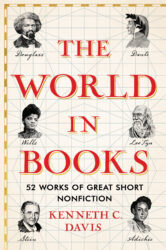
And read my article on religion in America, “America’s True History of Religious Tolerance” (Smithsonian)
Read more about the Puritans in Don’t Know Much About® History and America’s Hidden History.

America’s Hidden History, includes tales of “Forgotten Founders”
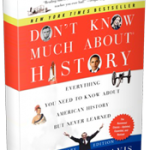
Don’t Know Much About History (Revised, Expanded and Updated Edition)
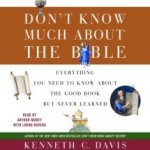
The post Who Started the “War on Christmas?” first appeared on Don't Know Much.
December 15, 2024
“The World in Books” A zoom event at the Camden, Maine Public Library
The Camden Public Library is delighted to welcome New York Times bestselling author Kenneth C. Davis for a talk about his latest book, The World in Books: 52 Works of Great Short Nonfiction, on Thursday, December 19 at 6:30 p.m. on Zoom.
This is a virtual program on Zoom. To attend, please register ahead of time here: https://us02web.zoom.us/webinar/register/WN_2ev9KVDiQx-7W1JnUddgdA
The post “The World in Books” A zoom event at the Camden, Maine Public Library first appeared on Don't Know Much.
December 12, 2024
The World in Books-Now Available
THE WORLD IN BOOKS:
52 Works of Great Short Nonfiction
Named to “The Most Anticipated: The Great Fall 2024 Preview” by The Millions
First Trade review from Kirkus Reviews
“A wealth of succinct, entertaining advice.” Full review
Now out from Scribner Books and Simon & Schuster Audio on October 8, 2024. Read more and preorder copies here.

More advance Praise for The World in Books:
“Kenneth C. Davis’s The World in Books is a testament to both the beauty and power of the written word. And also, a very smart guide to books that have changed the way we think – and sometimes even changed us.”
–Deborah Blum, Pulitzer-Prize winning author of The Poison Squad: One Chemist’s Single-Minded Crusade for Food Safety at the Turn of the Twentieth Century and the bestseller, The Poisoner’s Handbook.
“In his accessible, well-written, and unanticipatedly humorous The World in Books, Kenneth C. Davis takes readers on a journey that highlights fifty-two short yet provocative works of non-fiction. Highlighting both traditional favorites and contemporary classics, Davis offers his sharp insights in ways that appeal to the inquisitive mind, regardless of its familiarity with the selected texts. His poignant “Introduction” sets the stage for the contemporary relevance of why books like these matter in contemporary times, which makes this collection all the more relevant. Highly recommended for every person who treasures the freedom to read and values the transformative power it has for us all.”
—Dr. J. Michael Butler, Kenan Distinguished Professor of History, Flagler College and author of Beyond Integration
What a “Year of Reading–Briefly” looks like….
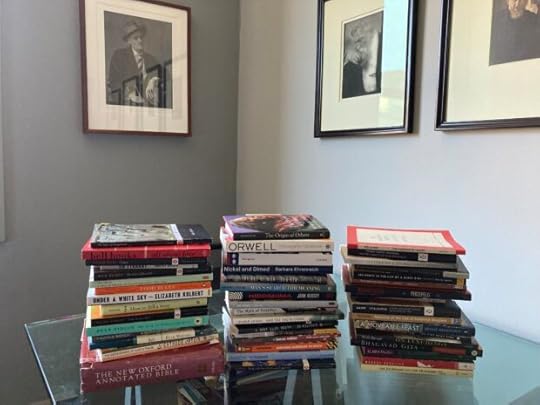
Photo credit Kenneth C. Davis
Among the 52 titles I have included are The Epic of Gilgamesh, Genesis, the poetry of Sappho, Meditations by Marcus Aurelius, and such profoundly influential writers as Frederick Douglass, Henry David Thoreau, Virginia Woolf, Helen Keller, James Baldwin, Susan Sontag, and Timothy Snyder.
The essential message of this book is that books matter–now more than ever. We must continue to educate ourselves. I believe that Open Books Open Minds.
I look forward to talking about this book in the coming months and sharing my fundamental belief that books can change us and the world.
In the meantime, please read and enjoy Great Short Books: A Year of Reading–Briefly
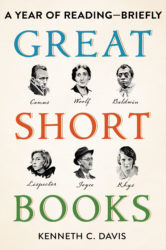
The post The World in Books-Now Available first appeared on Don't Know Much.
December 11, 2024
GREAT SHORT BOOKS: A Year of Reading–Briefly
NOW IN PAPERBACK
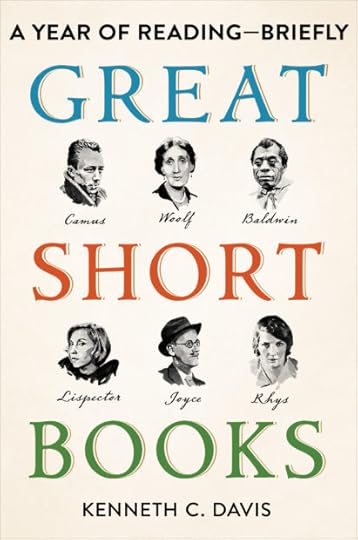
GREAT SHORT BOOKS:
A YEAR OF READING — BRIEFLY
Scribner/Simon & Schuster and Simon Audio (Unabridged audio download)
“An exciting guide to all that the world of fiction has to offer in 58 short novels — from ‘The Great Gatsby’ and ‘Lord of the Flies’ to the contemporary fiction of Colson Whitehead and Leïla Slimani — that, ‘like a first date,’ offer pleasure and excitement without commitment.” New York Times Book Review
Booklist “Editors’ Choice Adult Books 2022″
“…The most exceptional of the best books of 2022 reviewed in Booklist…”
“Delightfully accessible, Great Short Books: A Year of Reading–Briefly presents 58 fact-filled reviews of short books, a smorgasbord of titles sure to entice readers.” –Cheryl McKeon, Shelf Awareness
“I consider Davis’ ‘Great Short Books’ a gift to readers, a true treasure trove of literary recommendations.” —Sue Gilmore, SFGate
“Anyone who’s eternally time-strapped will treasure Kenneth C. Davis’ Great Short Books. This nifty volume highlights 58 works of fiction chosen by Davis for their size (small) and impact (enormous). Each brisk read weighs in at around 200 pages but has the oomph of an epic.” —Bookpage Full Review
“An entertaining journey with a fun, knowledgeable guide…. “ Kirkus Reviews
“A must-purchase for public and school libraries.” ALA Booklist
FIRST TRADE REVIEWS FROM KIRKUS, PUBLISHERS WEEKLY, BOOKLIST
“Davis feels that novels of 200 pages or less often don’t get the recognition they deserve, and this delightful book is the remedy…A must-purchase for public and school libraries.” *Starred Booklist review
“An entertaining journey with a fun, knowledgeable guide…. His love of books and reading shines through. From 1759 (Candide) to 2019 (The Nickel Boys), he’s got you covered.” –Kirkus Reviews
Full KIRKUS review here
“Davis’s conversational tone makes him a great guide to these literary aperitifs. This is sure to leave book lovers with something new to add to their lists.” FULL PUBLISHERS WEEKLY REVIEW here
During the lock-down, I swapped doom-scrolling for the insight and inspiration that come from reading great fiction. Inspired by Boccaccio’s “The Decameron” and its brief tales told during a pandemic, I read 58 great short novels –not as an escape but an antidote.
“A short novel is like a great first date. It can be extremely pleasant, even exciting, and memorable. Ideally, you leave wanting more. It can lead to greater possibilities. But there is no long-term commitment.”
–From “Notes of a Common Reader,” the Introduction to Great Short Books
Read “The Antidote to Everything,” an excerpt from the Introduction published on Lit Hub
The result is a compendium that goes from “Candide” to Colson Whitehead, and Edith Wharton to Leïla Slimani. And yes, Maus and many other Banned Books and Writers.

What “A Year of Reading–Briefly” looks like

Voltaire in Great Short Books
Art © Sam Kerr

Edith Wharton in Great Short Books
Art © Sam Kerr
Advance Praise for Great Short Books: A Year of Reading—Briefly
“GREAT SHORT BOOKS is a fascinating, thoughtful, and inspiring guide to a marvelous form of literature: the short novel. You can dip into this book anywhere you like, but I found myself reading it cover-to-cover, delighting in discovering new works while also revisiting many of my favorites. GREAT SHORT BOOKS is itself a great book—for those who are over-scheduled but want to expand their reading and for those who will simply delight in spending time with a passionate fellow reader who on every page reminds us why we need and love to read.”
–Will Schwalbe, New York Times bestselling author of THE END OF YOUR LIFE BOOK CLUB
“This is the book that you didn’t know you really needed. I began digging into this book as soon as I got it, and it was such a delight to read beautiful prose, just a sip at a time, with Kenneth Davis’ notes to give me context and help me more fully appreciate the stories. Keep this book near your bed or on your coffee table. It will be read and loved.”
–Celeste Headlee, journalist and author of WE NEED TO TALK and SPEAKING OF RACE

Recording audio book of Great Short Books (Sept. 2022) Photo by Katherine Cook
From hard-boiled fiction to magical realism, the 18th century to the present day, Great Short Books spans genres, cultures, countries, and time to present a diverse selection of acclaimed and canonical novels—plus a few bestsellers. Like browsing in your favorite bookstore, this eclectic compendium is a fun and practical book for any passionate reader hoping to broaden their collection— or anyone who is looking for an entertaining, effortless reentry into reading.
Listen to a sample of the audio book of Great Short Books
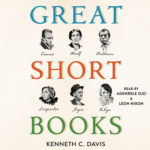
And Indie booksellers weigh in:
“Need something grand, something classic, uh…. something short to read, but don’t know where to start? Check out Kenneth Davis’s guide to Great Short Books and you’ll soon find just the right tale to delight your literary palate. For each suggestion, Davis gives us first lines, a plot summary, an author’s bio, a reason for reading it, and, finally, what you should read next from the author’s canon. Pick up a copy… you’ll be glad you did. You’re welcome!”—Linda Bond, Auntie’s Bookstore (Spokane, WA)
“Kenneth Davis has presented the perfect solution for too many books, not enough time—a collection of exceptional short books perfect for reading in a society seemingly without any free time. Many of the books may be familiar by name, some are obscure, some even forgotten, but all belong in the canon of superb literature. He teases with a brief synopsis and explains why each book deserves attention. An absolutely intriguing bonus is a short biographical sketch of each author, many of whom had fascinating but traumatic lives. It is the perfect book to provide comfort literature for busy readers.”—Bill Cusumano, Square Books (Oxford, Miss.)
More early reviews from readers at NetGalley.com
“GREAT SHORT BOOKS is a wonderful, breezy but deep look at the outstanding short books of the last 150 years. Kenneth C. Davis is a genius at summarizing each book and making the reader want to read said book post haste. This is a book I didn’t know the world needed but the world did.” –Tom O., reviewer
“…an incredibly valuable tool for book clubs and readers everywhere! Some authors/titles are well-known and others will be new discoveries….HIGHLY RECOMMENDED for any book group looking to find new titles or any reader who wants to know what to read next.” –Ann H. reviewer
“I found over a dozen new authors or titles I want to now read that were included in his main list, and the Further Reading at the end of each chapter and at the end of the volume itself.
As others have suggested, this is a great tool for Book Clubs!
Not Lit Crit, it is mostly focused on necessary, just-the-facts-mam information on one person’s reading of short books over a year. Well worth a read, and great for browsing!” –Stephen B., Librarian
“What better way to introduce new readers to more than 50 ‘short’ books. This handy book is full of non-spoiler descriptions and cultural context that situate these stories within our world.” –Kelsey W., librarian
S0urce: Great Short Books via NetGalley
I can’t wait to start talking about this book with readers everywhere.
Teachers, Librarians, Book Clubs and Other Learning Communities:
Invite me for a visit to your school, classroom, library, historical group, book club or conference.
The post GREAT SHORT BOOKS: A Year of Reading–Briefly first appeared on Don't Know Much.
November 25, 2024
Two for Thanksgiving: Real First Pilgrims & Holiday’s History
On the holiday calendar, when we leave Veterans Day behind, we round towards Thanksgiving — perhaps America’s most beloved, widely shared, and mythologized celebration.
But this reminds me of the fact that Abraham Lincoln’s first Thanksgiving proclamation came 161 years ago in 1863. It came in the midst of the Civil War in the same month Lincoln offered the Gettysburg Address. It must have felt like there was little to celebrate– or to be grateful for.
Like the Macy’s parade, this is my Thanksgiving tradition. I post two articles about the holiday with some “Hidden History” that appeared on the Op-Ed page of the New York Times.
So here’s something to read–either before or after the feast.
The first, from 2008, is called “A French Connection” and tells the story of the real first Pilgrims in America. They were French. In Florida. Fifty years before the Mayflower sailed. It did not end with a happy meal. In fact, it ended in a religious massacre.

Illustration by Nathalie Lété in the New York Times
TO commemorate the arrival of the first pilgrims to America’s shores, a June date would be far more appropriate, accompanied perhaps by coq au vin and a nice Bordeaux. After all, the first European arrivals seeking religious freedom in the “New World” were French. And they beat their English counterparts by 50 years. That French settlers bested the Mayflower Pilgrims may surprise Americans raised on our foundational myth, but the record is clear.
The complete story can be found in America’s Hidden History.

America’s Hidden History, includes tales of “Forgotten Founders”
The second is “How the Civil War Created Thanksgiving” (2014) and tells the story of the Union League providing Thanksgiving dinners to Union troops.
Of all the bedtime-story versions of American history we teach, the tidy Thanksgiving pageant may be the one stuffed with the heaviest serving of myth. This iconic tale is the main course in our nation’s foundation legend, complete with cardboard cutouts of bow-carrying Native American cherubs and pint-size Pilgrims in black hats with buckles. And legend it largely is.
In fact, what had been a New England seasonal holiday became more of a “national” celebration only during the Civil War, with Lincoln’s proclamation calling for “a day of thanksgiving” in 1863.
Enjoy them both.

Don’t Know Much About® History: Anniversary Edition
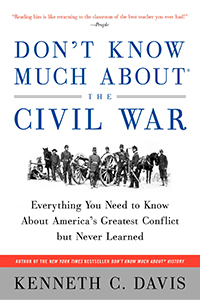
Don’t Know Much About the Civil War (Harper paperback, Random House Audio)

Now In paperback THE HIDDEN HISTORY OF AMERICA AT WAR: Untold Tales from Yorktown to Fallujah
The post Two for Thanksgiving: Real First Pilgrims & Holiday’s History first appeared on Don't Know Much.
November 18, 2024
The World in Books-Now Available
THE WORLD IN BOOKS:
52 Works of Great Short Nonfiction
Named to “The Most Anticipated: The Great Fall 2024 Preview” by The Millions
First Trade review from Kirkus Reviews
“A wealth of succinct, entertaining advice.” Full review
Now out from Scribner Books and Simon & Schuster Audio on October 8, 2024. Read more and preorder copies here.

More advance Praise for The World in Books:
“Kenneth C. Davis’s The World in Books is a testament to both the beauty and power of the written word. And also, a very smart guide to books that have changed the way we think – and sometimes even changed us.”
–Deborah Blum, Pulitzer-Prize winning author of The Poison Squad: One Chemist’s Single-Minded Crusade for Food Safety at the Turn of the Twentieth Century and the bestseller, The Poisoner’s Handbook.
“In his accessible, well-written, and unanticipatedly humorous The World in Books, Kenneth C. Davis takes readers on a journey that highlights fifty-two short yet provocative works of non-fiction. Highlighting both traditional favorites and contemporary classics, Davis offers his sharp insights in ways that appeal to the inquisitive mind, regardless of its familiarity with the selected texts. His poignant “Introduction” sets the stage for the contemporary relevance of why books like these matter in contemporary times, which makes this collection all the more relevant. Highly recommended for every person who treasures the freedom to read and values the transformative power it has for us all.”
—Dr. J. Michael Butler, Kenan Distinguished Professor of History, Flagler College and author of Beyond Integration
What a “Year of Reading–Briefly” looks like….

Photo credit Kenneth C. Davis
Among the 52 titles I have included are The Epic of Gilgamesh, Genesis, the poetry of Sappho, Meditations by Marcus Aurelius, and such profoundly influential writers as Frederick Douglass, Henry David Thoreau, Virginia Woolf, Helen Keller, James Baldwin, Susan Sontag, and Timothy Snyder.
The essential message of this book is that books matter–now more than ever. We must continue to educate ourselves. I believe that Open Books Open Minds.
I look forward to talking about this book in the coming months and sharing my fundamental belief that books can change us and the world.
In the meantime, please read and enjoy Great Short Books: A Year of Reading–Briefly

The post The World in Books-Now Available first appeared on Don't Know Much.
GREAT SHORT BOOKS: A Year of Reading–Briefly
NOW IN PAPERBACK

GREAT SHORT BOOKS:
A YEAR OF READING — BRIEFLY
Scribner/Simon & Schuster and Simon Audio (Unabridged audio download)
“An exciting guide to all that the world of fiction has to offer in 58 short novels — from ‘The Great Gatsby’ and ‘Lord of the Flies’ to the contemporary fiction of Colson Whitehead and Leïla Slimani — that, ‘like a first date,’ offer pleasure and excitement without commitment.” New York Times Book Review
Booklist “Editors’ Choice Adult Books 2022″
“…The most exceptional of the best books of 2022 reviewed in Booklist…”
“Delightfully accessible, Great Short Books: A Year of Reading–Briefly presents 58 fact-filled reviews of short books, a smorgasbord of titles sure to entice readers.” –Cheryl McKeon, Shelf Awareness
“I consider Davis’ ‘Great Short Books’ a gift to readers, a true treasure trove of literary recommendations.” —Sue Gilmore, SFGate
“Anyone who’s eternally time-strapped will treasure Kenneth C. Davis’ Great Short Books. This nifty volume highlights 58 works of fiction chosen by Davis for their size (small) and impact (enormous). Each brisk read weighs in at around 200 pages but has the oomph of an epic.” —Bookpage Full Review
“An entertaining journey with a fun, knowledgeable guide…. “ Kirkus Reviews
“A must-purchase for public and school libraries.” ALA Booklist
FIRST TRADE REVIEWS FROM KIRKUS, PUBLISHERS WEEKLY, BOOKLIST
“Davis feels that novels of 200 pages or less often don’t get the recognition they deserve, and this delightful book is the remedy…A must-purchase for public and school libraries.” *Starred Booklist review
“An entertaining journey with a fun, knowledgeable guide…. His love of books and reading shines through. From 1759 (Candide) to 2019 (The Nickel Boys), he’s got you covered.” –Kirkus Reviews
Full KIRKUS review here
“Davis’s conversational tone makes him a great guide to these literary aperitifs. This is sure to leave book lovers with something new to add to their lists.” FULL PUBLISHERS WEEKLY REVIEW here
During the lock-down, I swapped doom-scrolling for the insight and inspiration that come from reading great fiction. Inspired by Boccaccio’s “The Decameron” and its brief tales told during a pandemic, I read 58 great short novels –not as an escape but an antidote.
“A short novel is like a great first date. It can be extremely pleasant, even exciting, and memorable. Ideally, you leave wanting more. It can lead to greater possibilities. But there is no long-term commitment.”
–From “Notes of a Common Reader,” the Introduction to Great Short Books
Read “The Antidote to Everything,” an excerpt from the Introduction published on Lit Hub
The result is a compendium that goes from “Candide” to Colson Whitehead, and Edith Wharton to Leïla Slimani. And yes, Maus and many other Banned Books and Writers.

What “A Year of Reading–Briefly” looks like

Voltaire in Great Short Books
Art © Sam Kerr

Edith Wharton in Great Short Books
Art © Sam Kerr
Advance Praise for Great Short Books: A Year of Reading—Briefly
“GREAT SHORT BOOKS is a fascinating, thoughtful, and inspiring guide to a marvelous form of literature: the short novel. You can dip into this book anywhere you like, but I found myself reading it cover-to-cover, delighting in discovering new works while also revisiting many of my favorites. GREAT SHORT BOOKS is itself a great book—for those who are over-scheduled but want to expand their reading and for those who will simply delight in spending time with a passionate fellow reader who on every page reminds us why we need and love to read.”
–Will Schwalbe, New York Times bestselling author of THE END OF YOUR LIFE BOOK CLUB
“This is the book that you didn’t know you really needed. I began digging into this book as soon as I got it, and it was such a delight to read beautiful prose, just a sip at a time, with Kenneth Davis’ notes to give me context and help me more fully appreciate the stories. Keep this book near your bed or on your coffee table. It will be read and loved.”
–Celeste Headlee, journalist and author of WE NEED TO TALK and SPEAKING OF RACE

Recording audio book of Great Short Books (Sept. 2022) Photo by Katherine Cook
From hard-boiled fiction to magical realism, the 18th century to the present day, Great Short Books spans genres, cultures, countries, and time to present a diverse selection of acclaimed and canonical novels—plus a few bestsellers. Like browsing in your favorite bookstore, this eclectic compendium is a fun and practical book for any passionate reader hoping to broaden their collection— or anyone who is looking for an entertaining, effortless reentry into reading.
Listen to a sample of the audio book of Great Short Books

And Indie booksellers weigh in:
“Need something grand, something classic, uh…. something short to read, but don’t know where to start? Check out Kenneth Davis’s guide to Great Short Books and you’ll soon find just the right tale to delight your literary palate. For each suggestion, Davis gives us first lines, a plot summary, an author’s bio, a reason for reading it, and, finally, what you should read next from the author’s canon. Pick up a copy… you’ll be glad you did. You’re welcome!”—Linda Bond, Auntie’s Bookstore (Spokane, WA)
“Kenneth Davis has presented the perfect solution for too many books, not enough time—a collection of exceptional short books perfect for reading in a society seemingly without any free time. Many of the books may be familiar by name, some are obscure, some even forgotten, but all belong in the canon of superb literature. He teases with a brief synopsis and explains why each book deserves attention. An absolutely intriguing bonus is a short biographical sketch of each author, many of whom had fascinating but traumatic lives. It is the perfect book to provide comfort literature for busy readers.”—Bill Cusumano, Square Books (Oxford, Miss.)
More early reviews from readers at NetGalley.com
“GREAT SHORT BOOKS is a wonderful, breezy but deep look at the outstanding short books of the last 150 years. Kenneth C. Davis is a genius at summarizing each book and making the reader want to read said book post haste. This is a book I didn’t know the world needed but the world did.” –Tom O., reviewer
“…an incredibly valuable tool for book clubs and readers everywhere! Some authors/titles are well-known and others will be new discoveries….HIGHLY RECOMMENDED for any book group looking to find new titles or any reader who wants to know what to read next.” –Ann H. reviewer
“I found over a dozen new authors or titles I want to now read that were included in his main list, and the Further Reading at the end of each chapter and at the end of the volume itself.
As others have suggested, this is a great tool for Book Clubs!
Not Lit Crit, it is mostly focused on necessary, just-the-facts-mam information on one person’s reading of short books over a year. Well worth a read, and great for browsing!” –Stephen B., Librarian
“What better way to introduce new readers to more than 50 ‘short’ books. This handy book is full of non-spoiler descriptions and cultural context that situate these stories within our world.” –Kelsey W., librarian
S0urce: Great Short Books via NetGalley
I can’t wait to start talking about this book with readers everywhere.
Teachers, Librarians, Book Clubs and Other Learning Communities:
Invite me for a visit to your school, classroom, library, historical group, book club or conference.
The post GREAT SHORT BOOKS: A Year of Reading–Briefly first appeared on Don't Know Much.
November 10, 2024
11-11-11: Don’t Know Much About Veterans Day-The Forgotten Meaning
“The eleventh hour of the eleventh day of the eleventh month.”
[This is a revised version of a post originally written for Veterans Day in 2011. The meaning still applies. In 2024, November 11 falls on a Monday and the holiday is observed on Monday November 11.]

Taken at 10:58 a.m., on Nov. 11, 1918, just before the Armistice went into effect; men of the 353rd Infantry, near a church, at Stenay, Meuse, wait for the end of hostilities. (SC034981)
On Veterans Day, a reminder of what the day once meant and what it should still mean.
That was the moment at which World War I –then called THE GREAT WAR– largely came to end in 1918, at the eleventh hour of the eleventh day of the eleventh month.
One of the most tragically senseless and destructive periods in all history came to a close in Western Europe with the Armistice –or end of hostilities between Germany and the Allied nations — that began at that moment. Some 20 million people had died in the fighting that raged for more than four years since August 1914. The formal end of the war came with the Treaty of Versailles in June 1919.
Today, it is important to recognize the role of that treaty and the war in the rise of some of the most murderous dictators in history. That history is told in my new book, Strongman: The Rise of Five Dictators and the Fall of Democracy.
Besides the war casualties, an estimated 100 million people died during the war of the Spanish flu, a worldwide pandemic that was completely linked to the war and had an impact on its outcome. That is the subject of my recent book, More Deadly Than War:The Hidden History of the Spanish Flu and the First World War.

The date of November 11th became a national holiday of remembrance in many of the victorious allied nations –a day to commemorate the loss of so many lives in the war. And in the United States, President Wilson proclaimed the first Armistice Day on November 11, 1919. A few years later, in 1926, Congress passed a resolution calling on the President to observe each November 11th as a day of remembrance:
Whereas the 11th of November 1918, marked the cessation of the most destructive, sanguinary, and far reaching war in human annals and the resumption by the people of the United States of peaceful relations with other nations, which we hope may never again be severed, and
Whereas it is fitting that the recurring anniversary of this date should be commemorated with thanksgiving and prayer and exercises designed to perpetuate peace through good will and mutual understanding between nations; and
Whereas the legislatures of twenty-seven of our States have already declared November 11 to be a legal holiday: Therefore be it Resolved by the Senate (the House of Representatives concurring), that the President of the United States is requested to issue a proclamation calling upon the officials to display the flag of the United States on all Government buildings on November 11 and inviting the people of the United States to observe the day in schools and churches, or other suitable places, with appropriate ceremonies of friendly relations with all other peoples.
Of course, the hopes that “the war to end all wars” would bring peace were short-lived. By 1939, Europe was again at war and what was once called “the Great War” would become World War I. With the end of World War II, there was a movement in America to rename Armistice Day and create a holiday that recognized the veterans of all of America’s conflicts. President Eisenhower signed that law in 1954. (In 1971, Veterans Day began to be marked as a Monday holiday on the third Monday in November, but in 1978, the holiday was returned to the traditional November 11th date).
Today, Veterans Day honors the duty, sacrifice and service of America’s millions of veterans of all wars, unlike Memorial Day, which specifically honors those who died fighting in America’s wars. In 2022, according to the Census Bureau, there were 16.2 million veterans in the United States. (Source: US Census Bureau)
We should remember and celebrate all those men and women. But lost in that worthy goal is the forgotten meaning of this day in history –the meaning which Congress gave to Armistice Day in 1926:
to perpetuate peace through good will and mutual understanding between nations …
inviting the people of the United States to observe the day … with appropriate ceremonies of friendly relations with all other peoples.
The Library of Congress offers an extensive Veterans History Project.
Read more about World War I and all of America’s conflicts in Don’t Know Much About History and Don’t Know Much About the American Presidents.
I discuss the role of Americans in battle in more than 240 years of American history in THE HIDDEN HISTORY OF AMERICA AT WAR: Untold Tales from Yorktown to Fallujah (Hachette Books and Random House Audio).
MORE DEADLY THAN WAR: The Hidden History of the Spanish Flu and the First World War was published in May 2018. Strongman was published in 2020.

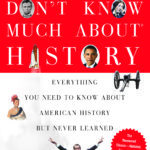
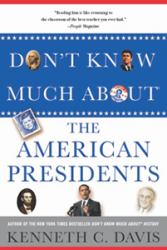
The post 11-11-11: Don’t Know Much About Veterans Day-The Forgotten Meaning first appeared on Don't Know Much.
October 29, 2024
Who Said It? “I must study politiciks and war…”

John Adams portrait by Gilbert Stuart
John Adams, writing to his wife Abigail from Paris (May 12, 1780)
I must study Politicks and War that my sons may have liberty to study Mathematicks and Philosophy. My sons ought to study Mathematicks and Philosophy, Geography, natural History, Naval Architecture, navigation, Commerce and Agriculture, in order to give their Children a right to study Painting, Poetry, Musick, Architecture, Statuary, Tapestry and Porcelaine.
Source: New England Historical Society
The post Who Said It? “I must study politiciks and war…” first appeared on Don't Know Much.



